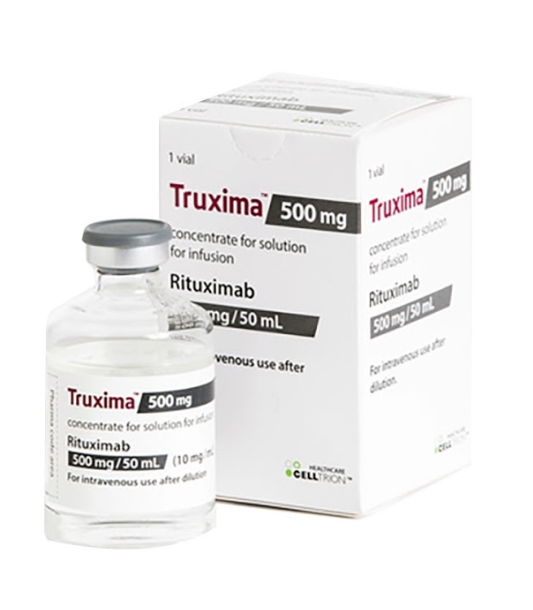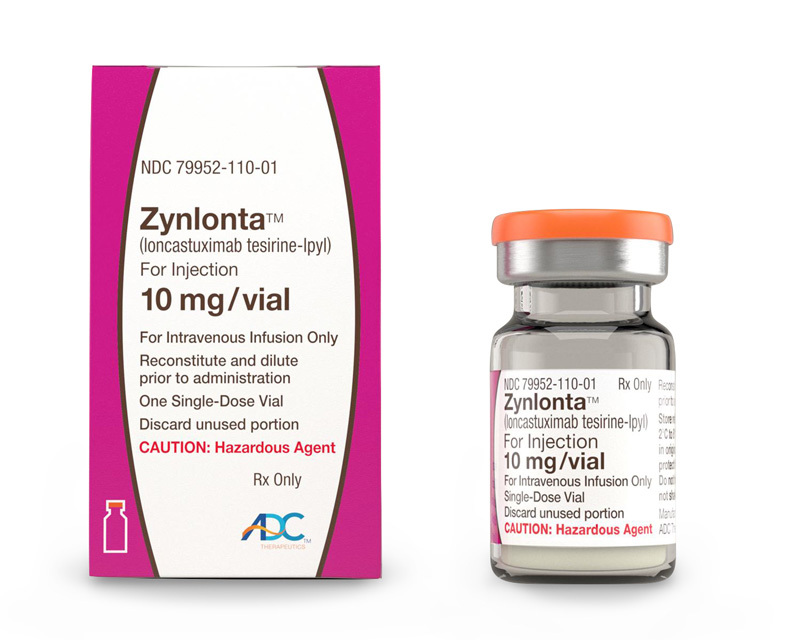Truxima (rituximab) vs Zynlonta (loncastuximab tesirine-lpyl)
Truxima (rituximab) vs Zynlonta (loncastuximab tesirine-lpyl)
Truxima (rituximab) is a CD20-directed cytolytic antibody that is used to treat various types of blood cancers, including non-Hodgkin's lymphoma and chronic lymphocytic leukemia, as well as certain autoimmune diseases; it works by targeting and destroying B cells. Zynlonta (loncastuximab tesirine-lpyl) is an antibody-drug conjugate specifically indicated for the treatment of adult patients with relapsed or refractory diffuse large B-cell lymphoma (DLBCL) after two or more lines of systemic therapy; it combines an antibody targeting CD19 with a cytotoxic agent. When deciding between the two, it is crucial to consider the specific type of cancer, the patient's treatment history, and the safety profiles of each drug, as Truxima is used more broadly in various conditions, while Zynlonta is specifically tailored for certain patients with DLBCL who have not responded to other treatments.
Difference between Truxima and Zynlonta
| Metric | Truxima (rituximab) | Zynlonta (loncastuximab tesirine-lpyl) |
|---|---|---|
| Generic name | Rituximab | Loncastuximab tesirine-lpyl |
| Indications | Non-Hodgkin's lymphoma, chronic lymphocytic leukemia, rheumatoid arthritis, granulomatosis with polyangiitis, microscopic polyangiitis | Relapsed or refractory large B-cell lymphoma |
| Mechanism of action | CD20-directed cytolytic antibody | CD19-directed antibody and alkylating agent conjugate |
| Brand names | Truxima, Rituxan, MabThera | Zynlonta |
| Administrative route | Intravenous infusion | Intravenous infusion |
| Side effects | Infusion reactions, fever, lymphopenia, chills, infection | Thrombocytopenia, neutropenia, anemia, fatigue, musculoskeletal pain |
| Contraindications | Severe infections, severe immunodeficiency | Hypersensitivity to loncastuximab tesirine-lpyl or any of its components |
| Drug class | Monoclonal antibody | Antibody-drug conjugate |
| Manufacturer | Celltrion Healthcare, Genentech (Roche) | ADC Therapeutics |
Efficacy
Truxima (rituximab) Efficacy in Treating Lymphoma
Truxima, a biosimilar to the original rituximab product, is a monoclonal antibody that targets the CD20 antigen on the surface of pre-B and mature B lymphocytes. It is used in the treatment of non-Hodgkin lymphoma (NHL) and has been shown to be effective in various subtypes of this disease, including follicular lymphoma and diffuse large B-cell lymphoma (DLBCL). In clinical trials, rituximab, in combination with chemotherapy, has significantly improved response rates and survival outcomes compared to chemotherapy alone. Truxima, as a biosimilar, is designed to have no clinically meaningful differences from the reference product in terms of safety, purity, and potency, thus offering similar efficacy in the treatment of lymphomas.
Zynlonta (loncastuximab tesirine-lpyl) Efficacy in Treating Lymphoma
Zynlonta is an antibody-drug conjugate specifically indicated for the treatment of adult patients with relapsed or refractory large B-cell lymphoma after two or more lines of systemic therapy. This novel therapeutic targets CD19, a protein expressed on the surface of B-cells, and delivers a cytotoxic agent directly to the cancer cells. In a pivotal phase 2 clinical trial, Zynlonta demonstrated a significant therapeutic effect, with a meaningful percentage of patients achieving complete or partial responses. This efficacy is particularly notable given that it is prescribed for patients who have not responded to or have relapsed after multiple other treatments, indicating its potential as a valuable treatment option in refractory cases of large B-cell lymphoma.
Comparative Efficacy in Lymphoma Treatment
While both Truxima and Zynlonta are used in the treatment of lymphoma, their indications and mechanisms of action differ. Truxima is often used as a first-line treatment in combination with chemotherapy, whereas Zynlonta is reserved for later lines of therapy in patients who have not responded to other treatments. The efficacy of Truxima in improving survival outcomes has been well-established in earlier lines of therapy, while Zynlonta's efficacy is notable in the context of refractory or relapsed disease. Both drugs have been significant additions to the therapeutic arsenal against lymphoma, expanding the options available to patients with different disease profiles and treatment histories.
Conclusion
Truxima and Zynlonta have both demonstrated efficacy in the treatment of lymphoma, albeit in different settings and lines of therapy. Truxima, as a biosimilar to rituximab, continues to be a cornerstone in the management of non-Hodgkin lymphoma, particularly when used in combination with chemotherapy. Zynlonta represents a newer class of targeted therapies providing hope for patients with relapsed or refractory large B-cell lymphoma, showcasing the progress in developing more effective treatment modalities for challenging cases of lymphoma. The use of these medicines must be tailored to the individual patient's disease characteristics and treatment history, and ongoing research continues to refine their role in lymphoma therapy.
Regulatory Agency Approvals
Truxima
-
European Medical Agency (EMA), European Union

-
Food and Drug Administration (FDA), USA

-
Health Canada

-
Therapeutic Goods Administration (TGA), Australia

-
Medsafe (NZ)

Zynlonta
-
European Medical Agency (EMA), European Union

-
Food and Drug Administration (FDA), USA

Access Truxima or Zynlonta today
If Truxima or Zynlonta are not approved or available in your country (e.g. due to supply issues), you can access them via Everyone.org.
How it works

Make an enquiry
Choose the medicine you want to buy, answer a couple of questions, and upload your prescription to speed things up. We’ll get back to you within 24 hours.


Make an enquiry
Choose the medicine you want to buy, answer a couple of questions, and upload your prescription to speed things up. We’ll get back to you within 24 hours.


Breeze through the paperwork
We'll guide you through the required documents for importing unapproved medicine, ensuring you have all the necessary information.


Get a personalized quote
We’ll prepare a quote for you, including medicine costs and any shipping, administrative, or import fees that may apply.


Receive your medicine
Accept the quote and we’ll handle the rest - sourcing and safely delivering your medicine.

Some text on this page has been automatically generated. Speak to your physician before you start a new treatment or medication.
Let's talk
If you have any questions, call us or send us a message through WhatsApp or email:
Contact us




